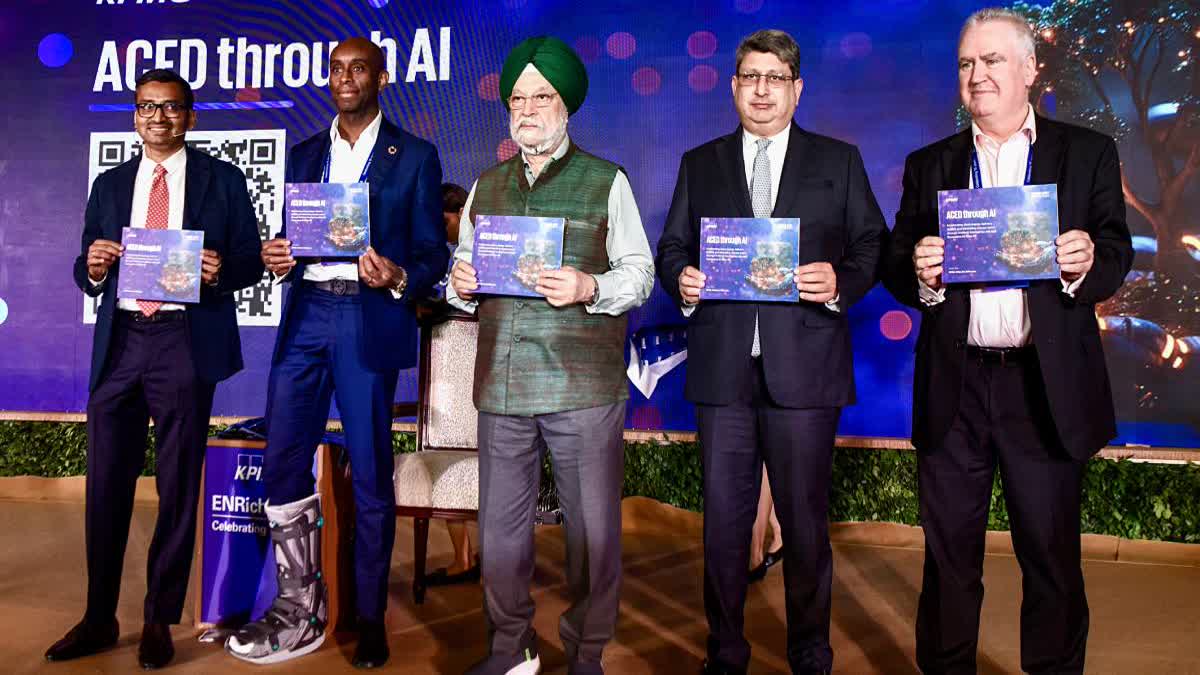New Delhi: The fifth edition of the Global Energy Conclave, ENRich 2024, focused on the transformative potential of artificial intelligence (AI) in the energy sector was held in New Delhi on Wednesday .
Themed 'AI Energy', it highlighted how AI is becoming a game-changer, optimising operations and contributing to a sustainable future for the energy industry.
Several industry honchos and policymakers attended the event, graced by Union Petroleum and Natural Gas Minister Hardeep Singh Puri, entrepreneur, investor and film producer Ronnie Screwvala and Prof V Kamakoti, Director of IIT, Madras.
Industry Leaders Weigh In on AI’s Role
In an exclusive conversation with ETV Bharat on the sidelines of the event, Screwvala praised the government’s efforts in adopting AI. “From data analysis to delivery mechanisms, AI has immense potential in the public sector. It’s not just a catalyst, but a delivery tool for schemes, improving bureaucratic efficiency,” he said.
Highlighting AI's potential in the healthcare sector, he said while India may lack extensive R&D budgets, AI can step in by streamlining processes and generating actionable insights. As a service-driven economy, India must upgrade its services sector through AI, whether in global capability centers (GCCs) or the IT sector.
“Taking services to the next level is essential for India’s growth, and AI will be a powerful tool in that journey,” he added.
Startups Driving AI Innovation
At the conclave, Amit Priyadarshan, founder and CEO of Caliche International, presented innovative technology for converting carbon emissions into valuable chemicals.
“We are responsible for emissions, but we also have the responsibility to address them,” he said. His startup aims to capture carbon from industrial chimneys and convert it into useful chemicals for agriculture and aquaculture, reducing the net carbon footprint.
“Carbon dioxide is a major greenhouse gas, contributing to global warming. Our technology directly tackles this challenge by capturing carbon from smoke and converting it into useful products, providing both environmental and economic benefits,” he explained.
S Shriram, director at FluxGen, a Bangalore-based tech company, discussed how AI was helping industries optimise water usage and energy consumption. “Our AI-based solutions are helping industries and PSUs monitor water usage in real-time, offering insights into how processes can be optimized,” Shriram said, emphasising the need for better water accountability in industries and how AI can ensure compliance and conservation.
He further discussed how FluxGen’s systems for rainwater and wastewater intelligence are designed to not only conserve water but also reduce energy consumption.
“We have seen a 10-15% reduction in energy consumption in wastewater treatment through AI-driven process optimisation,” he noted.
Shriram also highlighted the critical role of industry in sustaining growth, stating that AI's role in optimising industrial water usage is key to supporting future economic expansion.
A Catalyst for Efficiency and Sustainability
Underscoring the vital role of AI in reshaping the energy sector, Puri said the adoption of AI and generative AI (GenAI) was no longer optional but essential as India navigates the complexities of global energy markets. AI has the potential to generate a staggering ₹33.8 lakh crore of economic value in India by 2030, revolutionising the sector and accelerating growth.
He highlighted how AI was already transforming various sectors, and the energy industry was not an exception.
“AI is driving operational efficiency, improving safety and contributing to the transition towards a low-carbon future,” he said, pointing out that international oil companies are making significant investments in AI technologies and the Public Sector Undertakings (PSUs) were also harnessing the power of AI and machine learning (ML) to enhance safety and security while optimising operations.
Puri elaborated on the specific applications of AI in the oil and gas sector, particularly in upstream exploration and production. AI-enabled mechanisms such as deep learning are now used to analyze complex seismic data to identify potential hydrocarbon reservoirs. Moreover, AI-based predictive tools help mitigate drilling complications and optimise real-time drilling parameters, reducing operational costs and increasing efficiency.
Citing JP Morgan's study, Puri said the global impact of AI, with the potential of generative AI to boost global GDP growth to $7-10 trillion over the next three years, will enhance productivity and reshape industries.
AI in Energy: A Broader Perspective
AI is poised to revolutionise the energy sector, from upstream oil and gas exploration to downstream distribution. By leveraging AI for real-time data analysis and operational optimisation, companies are seeing improvements in efficiency, safety and sustainability.
In addition to AI’s impact on operations, the conclave also focused on AI’s potential to transform customer experience in the energy sector. Puri highlighted how tools like demand forecasting and pricing analytics were enhancing the way companies interact with consumers, offering more personalised and efficient services.
India’s PSUs are playing a leading role in this transformative journey. The modernisation of the National Data Repository—upgraded to a cloud-based platform with investment from the government, now allows instant access to seismic and production data, enhancing exploration efforts. AI-driven initiatives like this are helping India meet its energy needs while supporting the transition to a cleaner and more sustainable energy landscape.
AI’s Economic Impact
As India continues to embrace AI across industries, its economic potential is undeniable. Puri emphasised that AI adoption could contribute significantly to India’s GDP, helping the country achieve Prime Minister Narendra Modi’s vision of a ‘Viksit Bharat’ by 2047.
The event also deliberated on AI’s broader role in reshaping global economies. With AI-driven innovation, India is poised to emerge as a global leader in energy transformation, leveraging technology to create a sustainable and prosperous future.
ENRich 2024 concluded with a call to action for stakeholders across industries to explore the untapped potential of AI, emphasising the importance of aligning technological advancements with environmental and societal goals.
Also Read:
- PM Modi Honours ITBP On Raising Day; Celebrates Pali As Classical Language
- Cyclone Dana Landfall Live Update: Rains Lash Parts Of Odisha, West Bengal



